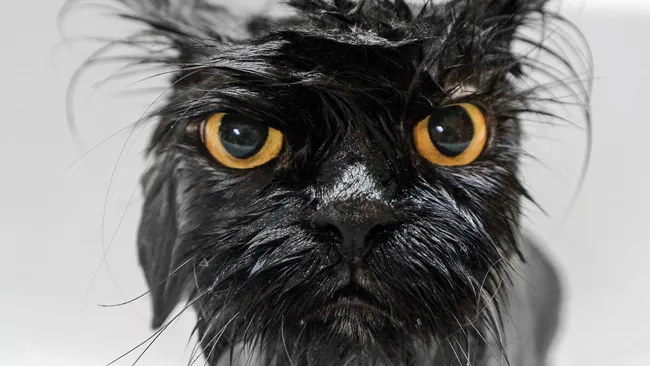It’s a well-known fact that most cats despise getting wet. But why?
Why Do Cats Hate Water? Experts Weigh In on the Classic Feline Quirk
It’s one of the most enduring feline stereotypes: cats and water just don’t mix. From scrambling out of the bathtub to glaring at a spray bottle, most cat parents have seen their fur babies recoil at the mere suggestion of getting wet.
And while there are exceptions — water-loving breeds like the Turkish Van and Maine Coon come to mind — the aversion to water remains a familiar trait for many domestic cats. But what’s behind this curious behavior?
Surprisingly, there’s little direct scientific research on why cats dislike water. However, experts suggest several likely factors rooted in biology, evolution, and early experiences.
Evolutionary Roots in the Desert
Kristyn Vitale, an animal behaviorist and founder of Maueyes Cat Science and Education, points to cats’ wild ancestors for a possible explanation. Domestic cats are believed to descend from the African wildcat (Felis silvestris lybica), a desert-dwelling species that rarely encountered large bodies of water.
“They are not particularly known for hunting near or in water,” Vitale told Live Science. “Their diet mainly consists of land-based prey like rodents, so it’s not surprising that domestic cats don’t seek out water — it’s just not something they were built to do.”
But the Evolution Theory Isn’t Water-Tight
Not all scientists are sold on that theory. Jonathan Losos, a biology professor at Washington University in St. Louis and author of The Cat’s Meow: How Cats Evolved from the Savanna to Your Sofa, argues that desert ancestry doesn’t necessarily explain an aversion to water.
He notes that African wildcats also live in less arid regions, where some exposure to water is possible. In other words, it may not be all about geography.
The Physical and Sensory Discomfort
Another possible reason cats avoid water: it’s simply uncomfortable. Jennifer Vonk, an animal cognition expert at Oakland University, explains that wet fur can become heavy and waterlogged, making it harder for cats to move. That vulnerability could trigger stress or fear.
There’s also the issue of scent. Cats are highly sensitive to smells, and getting wet might mask their natural odor or introduce unfamiliar, chemical smells — like those in tap water — that they find unpleasant. Vitale adds that water may even interfere with their pheromones, which are essential for communication and comfort.
Nature, Nurture — or Both?
Experts agree that a cat’s dislike of water probably results from a mix of natural instincts and learned behavior. Early experiences, especially during the kitten socialization period, can shape how they feel about water later in life.
While no studies directly link early water exposure to a love for it, Vitale suggests that introducing kittens to different textures and sensations, including water, could help them grow into more confident, adaptable adults.
Still, every cat is unique. “Even with water exposure, some kittens may still show aversion, while others who were never introduced to water might enjoy it,” Vitale says.
